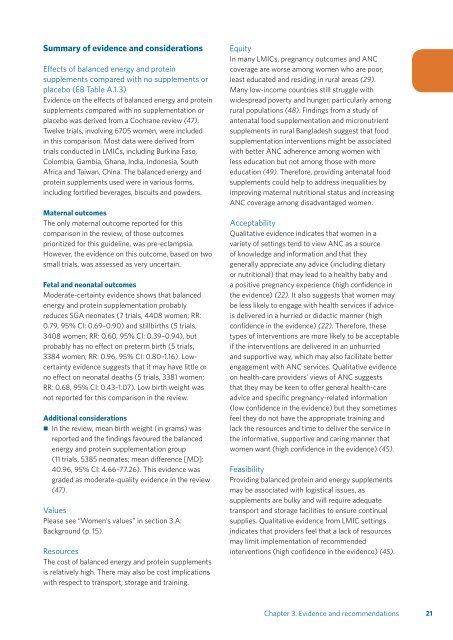WHO recommendations on antenatal care for a positive pregnancy experience
5pAUd5Zhw
5pAUd5Zhw
You also want an ePaper? Increase the reach of your titles
YUMPU automatically turns print PDFs into web optimized ePapers that Google loves.
Summary of evidence and c<strong>on</strong>siderati<strong>on</strong>s<br />
Effects of balanced energy and protein<br />
supplements compared with no supplements or<br />
placebo (EB Table A.1.3)<br />
Evidence <strong>on</strong> the effects of balanced energy and protein<br />
supplements compared with no supplementati<strong>on</strong> or<br />
placebo was derived from a Cochrane review (47).<br />
Twelve trials, involving 6705 women, were included<br />
in this comparis<strong>on</strong>. Most data were derived from<br />
trials c<strong>on</strong>ducted in LMICs, including Burkina Faso,<br />
Colombia, Gambia, Ghana, India, Ind<strong>on</strong>esia, South<br />
Africa and Taiwan, China. The balanced energy and<br />
protein supplements used were in various <strong>for</strong>ms,<br />
including <strong>for</strong>tified beverages, biscuits and powders.<br />
Maternal outcomes<br />
The <strong>on</strong>ly maternal outcome reported <strong>for</strong> this<br />
comparis<strong>on</strong> in the review, of those outcomes<br />
prioritized <strong>for</strong> this guideline, was pre-eclampsia.<br />
However, the evidence <strong>on</strong> this outcome, based <strong>on</strong> two<br />
small trials, was assessed as very uncertain.<br />
Fetal and ne<strong>on</strong>atal outcomes<br />
Moderate-certainty evidence shows that balanced<br />
energy and protein supplementati<strong>on</strong> probably<br />
reduces SGA ne<strong>on</strong>ates (7 trials, 4408 women; RR:<br />
0.79, 95% CI: 0.69–0.90) and stillbirths (5 trials,<br />
3408 women; RR: 0.60, 95% CI: 0.39–0.94), but<br />
probably has no effect <strong>on</strong> preterm birth (5 trials,<br />
3384 women; RR: 0.96, 95% CI: 0.80–1.16). Lowcertainty<br />
evidence suggests that it may have little or<br />
no effect <strong>on</strong> ne<strong>on</strong>atal deaths (5 trials, 3381 women;<br />
RR: 0.68, 95% CI: 0.43–1.07). Low birth weight was<br />
not reported <strong>for</strong> this comparis<strong>on</strong> in the review.<br />
Additi<strong>on</strong>al c<strong>on</strong>siderati<strong>on</strong>s<br />
• nIn the review, mean birth weight (in grams) was<br />
reported and the findings favoured the balanced<br />
energy and protein supplementati<strong>on</strong> group<br />
(11 trials, 5385 ne<strong>on</strong>ates; mean difference [MD]:<br />
40.96, 95% CI: 4.66–77.26). This evidence was<br />
graded as moderate-quality evidence in the review<br />
(47).<br />
Values<br />
Please see “Women’s values” in secti<strong>on</strong> 3.A:<br />
Background (p. 15).<br />
Resources<br />
The cost of balanced energy and protein supplements<br />
is relatively high. There may also be cost implicati<strong>on</strong>s<br />
with respect to transport, storage and training.<br />
Equity<br />
In many LMICs, <strong>pregnancy</strong> outcomes and ANC<br />
coverage are worse am<strong>on</strong>g women who are poor,<br />
least educated and residing in rural areas (29).<br />
Many low-income countries still struggle with<br />
widespread poverty and hunger, particularly am<strong>on</strong>g<br />
rural populati<strong>on</strong>s (48). Findings from a study of<br />
<strong>antenatal</strong> food supplementati<strong>on</strong> and micr<strong>on</strong>utrient<br />
supplements in rural Bangladesh suggest that food<br />
supplementati<strong>on</strong> interventi<strong>on</strong>s might be associated<br />
with better ANC adherence am<strong>on</strong>g women with<br />
less educati<strong>on</strong> but not am<strong>on</strong>g those with more<br />
educati<strong>on</strong> (49). There<strong>for</strong>e, providing <strong>antenatal</strong> food<br />
supplements could help to address inequalities by<br />
improving maternal nutriti<strong>on</strong>al status and increasing<br />
ANC coverage am<strong>on</strong>g disadvantaged women.<br />
Acceptability<br />
Qualitative evidence indicates that women in a<br />
variety of settings tend to view ANC as a source<br />
of knowledge and in<strong>for</strong>mati<strong>on</strong> and that they<br />
generally appreciate any advice (including dietary<br />
or nutriti<strong>on</strong>al) that may lead to a healthy baby and<br />
a <strong>positive</strong> <strong>pregnancy</strong> <strong>experience</strong> (high c<strong>on</strong>fidence in<br />
the evidence) (22). It also suggests that women may<br />
be less likely to engage with health services if advice<br />
is delivered in a hurried or didactic manner (high<br />
c<strong>on</strong>fidence in the evidence) (22). There<strong>for</strong>e, these<br />
types of interventi<strong>on</strong>s are more likely to be acceptable<br />
if the interventi<strong>on</strong>s are delivered in an unhurried<br />
and supportive way, which may also facilitate better<br />
engagement with ANC services. Qualitative evidence<br />
<strong>on</strong> health-<strong>care</strong> providers’ views of ANC suggests<br />
that they may be keen to offer general health-<strong>care</strong><br />
advice and specific <strong>pregnancy</strong>-related in<strong>for</strong>mati<strong>on</strong><br />
(low c<strong>on</strong>fidence in the evidence) but they sometimes<br />
feel they do not have the appropriate training and<br />
lack the resources and time to deliver the service in<br />
the in<strong>for</strong>mative, supportive and caring manner that<br />
women want (high c<strong>on</strong>fidence in the evidence) (45).<br />
Feasibility<br />
Providing balanced protein and energy supplements<br />
may be associated with logistical issues, as<br />
supplements are bulky and will require adequate<br />
transport and storage facilities to ensure c<strong>on</strong>tinual<br />
supplies. Qualitative evidence from LMIC settings<br />
indicates that providers feel that a lack of resources<br />
may limit implementati<strong>on</strong> of recommended<br />
interventi<strong>on</strong>s (high c<strong>on</strong>fidence in the evidence) (45).<br />
Chapter 3. Evidence and <str<strong>on</strong>g>recommendati<strong>on</strong>s</str<strong>on</strong>g> 21


